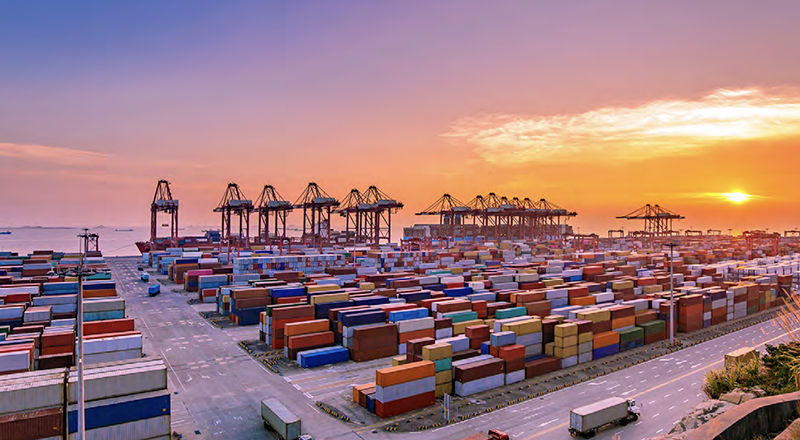Insights from Frank Clary, VP for Sustainability at Agility
In only a few months, the COVID-19 virus has been responsible for tens of thousands of deaths, with cases in 180 countries. The global pandemic has overwhelmed health systems in highly-developed markets, including Italy and Spain. Informed by the devastating impact of the COVID-19 pandemic on more developed countries with strong health systems, the humanitarian community is coming to terms with what could happen in vulnerable countries in Africa, Asia, and Latin America, already challenged with weaker institutions and networks.
Cascading, systemic risk in vulnerable countries
The combined weakness of core systems – health, telecom, education, food, transport, and others – means vulnerable countries face what are called cascading risks. Upon actualization of one risk, in this case, a health system overwhelmed by a global pandemic, more systemic risks are actualized, leading to the combined collapse of core systems, and potentially complete societal collapse.
In a country with many poor and vulnerable citizens, governments have limited levers that they can pull to help prevent or slow community spread. Many people live day-to-day and risk loss of livelihood if they self-isolate. Many live in precarious, crowded situations where self-isolation is not possible. It will not be possible to control community spread of the virus in communities where individuals must work every day to survive.
A shortage of personal protection equipment (PPE), already an issue in many countries in Europe and North America, precipitously increases the infection rate of first responders. Once infected, first responders cannot conduct tests, contact tracing, or treat patients. With first responders incapacitated, the public health system is considerably weakened, which could increase infection rates and contribute to significant death toll.
Humanitarian supply chains
In a humanitarian emergency, logistics is critically important for saving lives, and typically accounts for 75-80 percent of total spend. This crisis will be no different. The logistics challenge is particularly acute due to the global nature of this crisis, now that more than 50 countries currently restrict the export of medical supplies, including India, where a large proportion of the Active Pharmaceutical Ingredients (APIs) used in medicines originate.
Agility is working together with other logistics companies that make up part of the Logistics Emergency Team which supports the Logistics Cluster, led by the United Nations World Food Programme. The companies are creating a dynamic database of information that will be essential to ensure that the 40+ essential items on the WHO’s COVID-19 Disease Commodity Package get to vulnerable countries. The exercise includes data collection and analysis of 4 key factors critical for fast humanitarian response.
- Geographies of risk: which populations are most at risk of systemic failures?
- Export restrictions for countries that are producing essential items
- Import restrictions in vulnerable countries that apply to these essential items
- Capacity constraints for air, ocean and road freight from production countries to vulnerable countries
The sooner test kits, PPE and other essential goods can get to people who need them, the more likely these countries can manage the crisis before it gets out of hand. Agility is also donating warehouse space for storage of humanitarian supplies in Ghana, Malaysia and Dubai.
At the same time, Agility is leveraging its global network, and particularly relationships with suppliers and local governments in emerging markets to get up-to-date information on how the situation is changing. Agility’s COVID-19 Global Shipping Updates are maintained by a network of logistics service providers all over the world, offering information in real time from their countries, as the situation evolves.
A Call to Action: we all can help vulnerable countries respond to COVID-19
For this global crisis, what you do to build resilience in your community, your company, or your supply chain affects the quantity and availability of life-saving products for vulnerable countries. We must keep life-saving cargo moving.
For logistics companies: share information that we can share with humanitarian organizations, particularly in terms of fast-changing export and import restrictions and available capacity
For shippers: collaborate closely with your freight forwarders, carriers, and others – especially for pharmaceutical industry. Sky-high air freight rates and capacity shortages are prompting players to go it alone, just when we need to work together to bring costs down and free up capacity. Collaboration between stakeholders can improve asset utilization, which could help bring costs down and overcome capacity constraints on some critical trade lanes.
For governments: governments need to ensure that exports of humanitarian supplies to vulnerable countries continue, especially to countries unable to limit community spread and to locations where cascading system breakdowns could lead to heavy loss of life and societal collapse. Catastrophe in vulnerable countries will prolong the global crisis for everyone. Particularly for those countries that are ramping up production of PPE and life-saving equipment, it is important to work with humanitarian organizations to consider how to ensure that humanitarian cargo is able to flow freely to vulnerable populations.
For individuals: self-isolate, and reserve PPE and medicines for first-responders who really need them to do things such as contact tracing, testing and treating patients. The faster communities recover, the more expertise, PPE and other life-saving commodities will be available in the global supply chain to reach more vulnerable populations.
The global trade system has a responsibility now to keep cargo moving in order to protect vulnerable populations. #keepcargomoving


